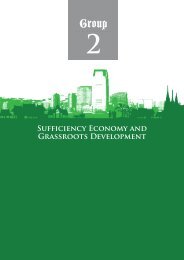Conflict, Legitimacy and Government Reform: Equitable Allocation of ...
Conflict, Legitimacy and Government Reform: Equitable Allocation of ...
Conflict, Legitimacy and Government Reform: Equitable Allocation of ...
You also want an ePaper? Increase the reach of your titles
YUMPU automatically turns print PDFs into web optimized ePapers that Google loves.
Judicial Review <strong>and</strong> Judicial Activism<br />
Judicial Power <strong>and</strong> Judicial Governance<br />
Dr. Udom Rathamarit<br />
Faculty <strong>of</strong> Law, Thammasat University<br />
Since Thail<strong>and</strong> changed its governing<br />
system to democracy, among the<br />
organizations empowered to exercise<br />
state’s sovereignty, like the legislature <strong>and</strong> the<br />
executive, only the judiciary or court has<br />
been continuously trusted by Thai society.<br />
Furthermore, the judiciary has its own<br />
tradition <strong>of</strong> exercising power under Royal<br />
endorsement <strong>of</strong> His Majesty, the revered<br />
King. Naturally, courts will adhere to justice<br />
<strong>and</strong> rationality within the law’s framework in<br />
judging the cases without prejudice for all<br />
who come to seek justice.<br />
In the situation <strong>of</strong> the continuous<br />
change in Thai society, like social change,<br />
economic change <strong>and</strong> political change, the<br />
judge or tulakar is an ordinary human being,<br />
who sometimes feels love, greed, anger or<br />
confusion. To make judges adhere to justice<br />
without any deviation, there must be a<br />
process to build public awareness <strong>of</strong> honesty<br />
<strong>and</strong> virtue; this learning process has to be<br />
141














